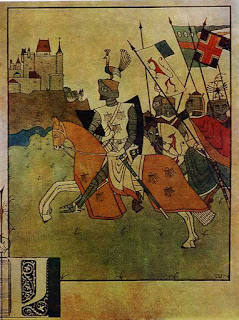By Kim Rendfeld
What happened at the Pass of Roncevaux
in 778 was so traumatic no one wrote about it for decades, not while Emperor
Charlemagne was alive. Yet a heavily altered version of the event became the
basis of a poem to inspire Crusaders.
First, a little backstory: Three
Saracen emirs from Hispania (Spain) visited King Charles, as he was known at
the time, during his assembly in 777 at Paderborn to ask for his aid is
overthrowing the Muslim ruler of Cordova. Perhaps the emirs told Charles
Christian cities would welcome a Christian king. Perhaps they said the emir of
Cordova would encroach on Frankish territory, as
evidenced by a letter from Pope Hadrian referring to Charles’s fear of invasion.
Saracens had invaded Francia in the past.
The original Royal Frankish Annals,
Charles’s official record, say everything was hunky-dory. Charles marched into
Hispania with a vast army, got hostages at Zaragoza, destroyed Pamplona (a
Basque Christian city), subjugated the Basques (also called the Gascons), and
returned home.
No mention at all of the Pass of Roncevaux
in the Pyrenees.
What was so awful that Charles wanted
it omitted? The earliest account of the battle, written in the Revised Royal
Frankish Annals between 814 (the year Charles died) and 817, provides clues. The
Reviser writes about the Basque ambushing the rear guard from the heights of
the Pyrenees. Many high-ranking court officials died, the baggage train was
plundered, and the enemy scattered in all directions. “To have suffered this
wound shadowed the king’s view of his success in Spain,” the Reviser writes.
However, Einhard, writing a biography
of Charles about 830-33, more than 50 years after the event, gives the most
detailed description of the attack, which takes place as the sky is darkening:
“In a densely wooded area well suited for ambush, the Basques had prepared to
attack the army from the highest mountain. As the [Frankish] troops were
proceeding in a long column through the narrow mountain passes, the Basques
descended on the baggage train and the protecting rear guard and forced them
into the valley. In the ensuing battle, the Basques slaughtered them to a man.”
Einhard also provides three names: Anselm,
the count of the palace, Eggihard, the seneschal, and Hruodland (Roland),
prefect of the March of Brittany. Einhard’s work is the only historical
reference to Hruodland, the hero of my forthcoming novel, The Cross and the Dragon.
Fast forward to the 11th century, and
you get a different take in “The Song of Roland.” A very different take. The
poem says a lot about courage in the face of overwhelming odds and betrayal.
But don’t look to it for historical accuracy. The most notable change is the
enemy, Muslim Saracens, just like the Crusaders were fighting. The poem makes
no mention of the Basques or of the Franks destroying a Christian city.
It was propaganda before the term
existed.
Learn more about The Song of Roland in Kim's novel The Cross and the Dragon in Masscares: Roncevaux 778, Part II - Wed. May 23
Sources:
Einhard’s The Life of Charlemagne translated by Evelyn Scherabon Firchow and
Edwin H. Zeydel
Carolingian Chronicles,
which includes the Royal Frankish Annals and Nithard’s Histories, translated by Bernard Walter Scholz with Barbara Rogers
“The Song of Roland,” translated by
John O'Hagan, www.fordham.edu/halsall/basis/roland-ohag.asp
Caption info:
The Emperor Charlemagne Finds Roland's
Corpse after the Battle of Roncevaux, c.1460, Jean Fouquet
Roland at Roncesvalles, c.1869,
Odilon Redon
Illustration to The Song of
Roland, 1903, Heorhiy Narbut
Kim Rendfeld is the author of The Cross and the Dragon, to be
published by Fireship Press. For more about Kim and her fiction, visit www.kimrendfeld.com, read her blog at www.kimrendfeld.wordpress.com, like her on Facebook at www.facebook.com/authorkimrendfeld, or follow her on Twitter at @kimrendfeld.



